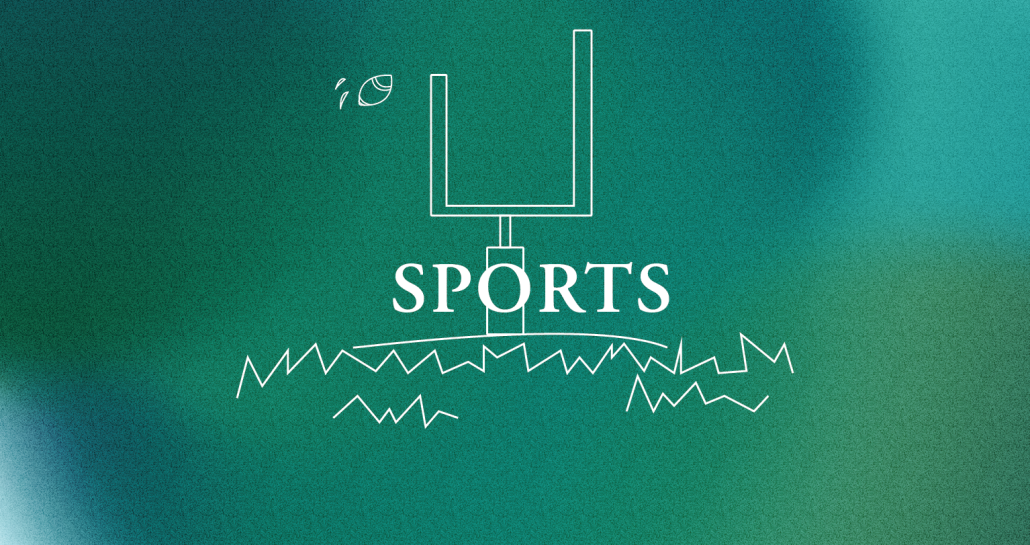HEART TO HEART
In my goldfish era
The catch behind an athlete’s mental pillar.
The catch behind an athlete’s mental pillar.


According to fictional football coach and personal hero Ted Lasso (Jason Sudeikis), a goldfish only has a memory of a few seconds. In Lasso’s opinion, the average goldfish can be found in freshwater, peacefully floating about with no concept of time, space or stress. The goldfish could have a near miss with a fishing hook and, moments later, fall back into bliss.
As a coach, Lasso uses this story as a tactic for players struggling with mental health issues. Lasso tells one of his players, Sam Obisanya (Toheeb Jimoh), “You know what the happiest animal on Earth is? It’s a goldfish. It’s got a 10-second memory. Be a goldfish.”
Before the premiere of this episode in 2021, the concept of being a goldfish was one I was not familiar with. My life in sports has always consisted of overthinking — from obsessing about a missed shot or an unnecessary foul to endless debating on whether or not to continue playing competitive sports at all.
In my beginning years of attempted athleticism, I was told to just flush it: Clear your mind, look at the bigger picture, work harder and learn from your mistakes. Those sentiments were all meant as positive motivation, of course. But those words were simply scrambled letters in my brain, begging me to let it go when my instinct was to hold on.
That pent-up anxiety festering under my skin for a decade, combined with the realization that I am, in fact, a senior and the countdown to adulthood is live, I am proclaiming this year as my goldfish year. That doesn’t mean I’ll be swimming in the Los Angeles River or turning bright orange. It means that of the 39,998,160 minutes of our lives, one bad minute won’t impact my mental health more than it’s worth.
In sports, one minute of a game can make or break an entire season or even an entire franchise. For swimming or track, a hundredths of a second can take an individual out of the running for an Olympic medal. With stakes like these, how can you successfully become the goldfish we all dream of being?
The habits we build up surrounding our short-term memory are what make or break these moments. An athlete can practice for hours a day, work out until their muscles burst out of their skin and attain the best physical odds to win in their sport. But if something goes awry, that athlete is reduced to the moment of their mistake, not the lifetime of movement towards that goal.
However, if that athlete trains both their body and brain, one mistake will be reduced to just that — not a career-ending error.
This belief that athletics is as mental as it is physical is what inspired me to write this column. It’s an effort to destigmatize the misconception that athletes are all brawn, no brains because athletes need to construct mental and physical pillars to achieve greatness.
Being a goldfish doesn’t mean one should forget about everything they’ve done wrong, on or off the field, but rather, one should have the mental stability to learn from their mistakes instead of dwelling on them. Easier said than done.
Overachievers, like many of the students puttering around this very campus, may benefit from the goldfish mindset. Maybe it’s senioritis, or maybe I’m actually giving myself a break for once. A deep breath and some positive self-talk every once in a while shouldn’t hurt.
Despite being a self-proclaimed “old head” at the Daily Trojan, I want to embrace this goldfish concept. There’s something special about starting fresh — no pressure to perform, no previous season’s success hovering over you and the ability to surprise people with your skills. As I’ve gotten older — which is all relative because I admit I am still very young — I have discovered the novelty of starting anew.
I don’t want to let go of the feeling of a fresh start. This may be one of my last semesters writing for this newspaper, but it’s my rookie season of the goldfish era.
Dana Hammerstrom is a senior writing about the mental health of collegiate athletes, as well as the emotional pressures they face, in her column “Heart to Heart,” which runs every other Friday.
We are the only independent newspaper here at USC, run at every level by students. That means we aren’t tied down by any other interests but those of readers like you: the students, faculty, staff and South Central residents that together make up the USC community.
Independence is a double-edged sword: We have a unique lens into the University’s actions and policies, and can hold powerful figures accountable when others cannot. But that also means our budget is severely limited. We’re already spread thin as we compensate the writers, photographers, artists, designers and editors whose incredible work you see in our daily paper; as we work to revamp and expand our digital presence, we now have additional staff making podcasts, videos, webpages, our first ever magazine and social media content, who are at risk of being unable to receive the support they deserve.
We are therefore indebted to readers like you, who, by supporting us, help keep our paper daily (we are the only remaining college paper on the West Coast that prints every single weekday), independent, free and widely accessible.
Please consider supporting us. Even $1 goes a long way in supporting our work; if you are able, you can also support us with monthly, or even annual, donations. Thank you.
This site uses cookies. By continuing to browse the site, you are agreeing to our use of cookies.
Accept settingsDo Not AcceptWe may request cookies to be set on your device. We use cookies to let us know when you visit our websites, how you interact with us, to enrich your user experience, and to customize your relationship with our website.
Click on the different category headings to find out more. You can also change some of your preferences. Note that blocking some types of cookies may impact your experience on our websites and the services we are able to offer.
These cookies are strictly necessary to provide you with services available through our website and to use some of its features.
Because these cookies are strictly necessary to deliver the website, refusing them will have impact how our site functions. You always can block or delete cookies by changing your browser settings and force blocking all cookies on this website. But this will always prompt you to accept/refuse cookies when revisiting our site.
We fully respect if you want to refuse cookies but to avoid asking you again and again kindly allow us to store a cookie for that. You are free to opt out any time or opt in for other cookies to get a better experience. If you refuse cookies we will remove all set cookies in our domain.
We provide you with a list of stored cookies on your computer in our domain so you can check what we stored. Due to security reasons we are not able to show or modify cookies from other domains. You can check these in your browser security settings.
These cookies collect information that is used either in aggregate form to help us understand how our website is being used or how effective our marketing campaigns are, or to help us customize our website and application for you in order to enhance your experience.
If you do not want that we track your visit to our site you can disable tracking in your browser here:
We also use different external services like Google Webfonts, Google Maps, and external Video providers. Since these providers may collect personal data like your IP address we allow you to block them here. Please be aware that this might heavily reduce the functionality and appearance of our site. Changes will take effect once you reload the page.
Google Webfont Settings:
Google Map Settings:
Google reCaptcha Settings:
Vimeo and Youtube video embeds:
The following cookies are also needed - You can choose if you want to allow them:
